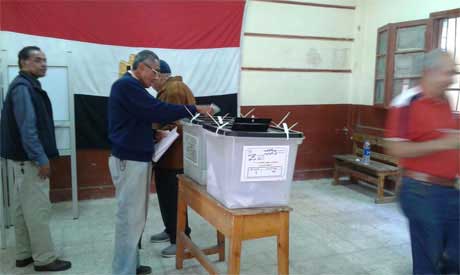Polling stations opened in 13 of Egypt's 27 governorates on Sunday, including Cairo, for the first day of voting in the second stage of the 2015 parliamentary elections.
Speaking early on Sunday afternoon, Cairo Governor Galal Saed told MENA agency that voter turnout is expected to increase in the next few hours, after he visited a number of polling stations in downtown Cairo.
According to an Ahram Online reporter in Cairo, the turnout at many polling stations seems below average as of midday.
As well as Cairo, voters in the governorates of Qalioubiya, Daqahliya, Menoufiya, Gharbiya, Kafr El-Sheikh, Sharqiya, Damietta, Port Said, Ismailia, Suez, North Sinai, and South Sinai will be able to cast their votes on Sunday and Monday, with polls open from 9am to 9pm.
Voters in the remaining 14 governorates had cast their votes in October, with turnout reaching 26.5 percent, according to the supervising High Elections Committee (HEC).
In the Nile Delta governorate of Gharbiya, turnout was estimated at 12 percent of the registered electorate by midday, according to the provincial operation department monitoring the polls.
In Qalioubiya, just north of Cairo, some polling stations saw high or moderate turnout--mostly of the elderly and of farmers, an Al-Ahram Arabic reporter said.
In Menoufiya, also in the Nile Delta, governor Hisham Abdel-Baset said turnout was "satisfactory" so far as he visited a polling station in provincial capital Shibin Al-Koum. Almost a quarter of polling stations in the governorate were late to open their doors, according to Al-Ahram Arabic.

Voting in Garden City, Cairo. (Photo: Mai Shaheen)
In North Sinai governorate, where the army has been fighting an Islamist insurgency for several years, police and army forces have been heavily deployed to facilitate the vote. Several roads were partially closed off in order to secure polling stations.
Around the country, an estimated 160,000 army personnel have been deployed around the 13 governorates currently voting in order to aid the police in securing the polls.
Alongside the interior ministry's plan to secure polling stations, a parallel plan has been put in place to secure vital venues as well as diplomatic sites in the capital, the head of Cairo's Security Directorate, Khaled Abdel-Aal, told MENA agency.
Minister of Manpower Gamal Sorour told state news agency MENA on Sunday afternoon that both Sunday and Monday would be a half-day for state employees, to allow them to vote.
The spokesman for the High Elections Committee, Omar Marawan, said 93 polling stations had opened late on Sunday.
The committee has so far received 141 complaints about violations during ballot-casting on the first day of the two-day vote, Marwan told reporters in comments broadcast on local television.
A total of 55,606,578 Egyptians are eligible to vote in the elections; 27,402,353 were eligible to vote during the first stage, while 28,204,225 are eligible in the second.
A total of 282 parliamentary seats will be up for competition in the second stage, with 222 seats for independent candidates and 60 seats allocated to party-based lists.
The 222 independents will be elected from 102 constituencies, and the 60 party-based MPs will be elected in two separate constituencies, one which holds 45 seats and the other 15.
Egyptian expats registered as residents of any of the 13 governorates active in the second stage are eligible to vote at Egyptian diplomatic missions, beginning on Saturday and concluding on Sunday.
Egypt's parliament — the House of Representatives — will be comprised of 596 members, 448 elected as independents and 120 from party-based lists. The remaining 28 seats will be filled by presidential appointments.
Egypt has been without a parliament since the 2011 body was dissolved in June 2012 due to the unconstitutionality of an election law.
President Sisi has held legislative powers since his election in 2014 due to the absence of an elected parliament.
Short link: